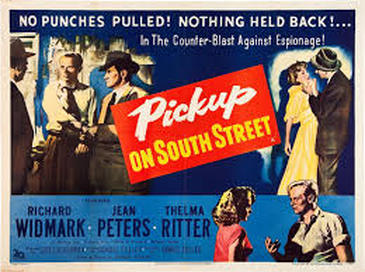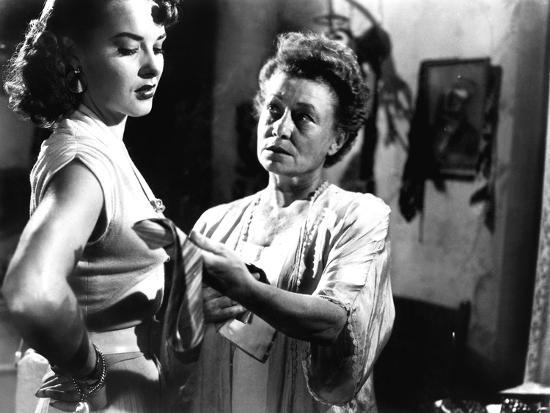← Back to Reviews
in
Pickup on South Street
The Hollywood Blacklisting was having a serious impact on Hollywood, not only on the artists bringing material to the screen, but the material itself. A prime example of this change in material was a tidy little noir-ish thriller from 1953 called Pickup on South Street that tells a compelling story in an economic manner and features a superb, Oscar-nominted performance from, arguably, Hollywood's greatest character actress.

This dandy little nail-biter stars Richard Widmark as Skip McCoy, a two-bit pickpocket who has only been out of jail for a week when he lifts the wallet out of a purse belonging to a tough-as-nails-hooker named Candy, who is instructed by her boyfriend to come home immediately when he learns the the wallet is gone. Neither Skip nor Candy are aware that the wallet contained a piece of secret microfilm that is connected to a communist plot and that Candy's boyfriend is secretly communist. Candy and the police are able to locate the microfilm with the assistance of a hardened police informant named Mo Williams (Thelma Ritter), but Candy's boyfriend wants that microfilm back and has no qualms about going through Candy and Mo to do it.

Samuel Fuller, probably best categorized as a "B" movie director, created his masterpiece, mounting an atmospheric crime drama in the city that never sleeps, where the city of Manhattan almost becomes another character in the story. This is the earliest film I can recall that so effectively establishes that midnight to dawn atmosphere that was so prevalent in crime dramas of the 1970's and 80's. It's given an added air of distinction by making the main antagonist a communist, something that probably never would have found its way to the screen if the film had been made five years before it was, but the Hollywood witch hunt was on the front burner in 1953 and many filmmakers felt the need to comment on what was going on through their work.

Fuller gives the film a real Hitchcock kind of opening that absolutely demands viewer attention. When we see Candy on the subway, the camera shows us several men watching her and we're really not sure why. An immediate sense of danger was established for the Candy character that draws the viewer in immediately. Someone who tunes in after the opening credits would have been hard pressed to tell which one of these guys was going to be a problem for Candy...at least until Widmark enters the picture.

Widmark brings a sexy and dangerous quality to Skip McCoy and Jean Peters is seriously cast against type as Candy and works very hard at being believable in the role. As expected, the acting honors go to the incomparable Thelma Ritter, who earned the 4th of her six career Best Supporting Actress nominations for the pitiful Mo Williams. Her final scene in the film is a total heartbreaker. This film works because of the best work of the respective careers of Samuel Fuller and Thelma Ritter.
The Hollywood Blacklisting was having a serious impact on Hollywood, not only on the artists bringing material to the screen, but the material itself. A prime example of this change in material was a tidy little noir-ish thriller from 1953 called Pickup on South Street that tells a compelling story in an economic manner and features a superb, Oscar-nominted performance from, arguably, Hollywood's greatest character actress.

This dandy little nail-biter stars Richard Widmark as Skip McCoy, a two-bit pickpocket who has only been out of jail for a week when he lifts the wallet out of a purse belonging to a tough-as-nails-hooker named Candy, who is instructed by her boyfriend to come home immediately when he learns the the wallet is gone. Neither Skip nor Candy are aware that the wallet contained a piece of secret microfilm that is connected to a communist plot and that Candy's boyfriend is secretly communist. Candy and the police are able to locate the microfilm with the assistance of a hardened police informant named Mo Williams (Thelma Ritter), but Candy's boyfriend wants that microfilm back and has no qualms about going through Candy and Mo to do it.

Samuel Fuller, probably best categorized as a "B" movie director, created his masterpiece, mounting an atmospheric crime drama in the city that never sleeps, where the city of Manhattan almost becomes another character in the story. This is the earliest film I can recall that so effectively establishes that midnight to dawn atmosphere that was so prevalent in crime dramas of the 1970's and 80's. It's given an added air of distinction by making the main antagonist a communist, something that probably never would have found its way to the screen if the film had been made five years before it was, but the Hollywood witch hunt was on the front burner in 1953 and many filmmakers felt the need to comment on what was going on through their work.

Fuller gives the film a real Hitchcock kind of opening that absolutely demands viewer attention. When we see Candy on the subway, the camera shows us several men watching her and we're really not sure why. An immediate sense of danger was established for the Candy character that draws the viewer in immediately. Someone who tunes in after the opening credits would have been hard pressed to tell which one of these guys was going to be a problem for Candy...at least until Widmark enters the picture.

Widmark brings a sexy and dangerous quality to Skip McCoy and Jean Peters is seriously cast against type as Candy and works very hard at being believable in the role. As expected, the acting honors go to the incomparable Thelma Ritter, who earned the 4th of her six career Best Supporting Actress nominations for the pitiful Mo Williams. Her final scene in the film is a total heartbreaker. This film works because of the best work of the respective careers of Samuel Fuller and Thelma Ritter.
